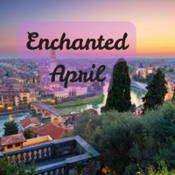
Overview
Synopsis
Sweet-natured Lotty Wilton is suffering depression from the bleak London winter, and from an oppressive relationship with her pompous solicitor husband. When she sees an advertisement in the paper to rent a castle in Italy for the month of April, an idyllic spot “for those who appreciate wisteria and sunshine,” she jumps at the chance to escape her downtrodden existence. Sensing an instant kinship with fellow housewife Rose Arnott, a severely angelic woman with sorrows of her own, Lotty persuades her along on the adventure. Seeking to reduce the costs, the two ladies find Caroline Bramble, a beautiful and exhausted socialite, and Mrs. Graves, an overbearing widow, to round out the party. As the month passes, verdant sun-drenched San Salvatore works its magic on each sad and hardened heart, healing grief and bringing hope. And with the arrival of two chastened husbands and one attractive young artist, romance blooms again. Matthew Barber’s Enchanted April, based on Elizabeth Von Arnim’s beloved novel of the 1920s, is a gentle and romantic comedy of manners. Against the backdrop of a country still reeling from World War I, Enchanted April offers to its characters, and viewers, a necessary balm of sunshine and renewal.
Show Information
Context
Plot
Characters
| Name | Part Size | Gender | Vocal Part |
|---|---|---|---|
|
Lead |
Female |
Spoken |
|
|
Lead |
Female |
Spoken |
|
|
Lead |
Female |
Spoken |
|
|
Lead |
Female |
Spoken |
|
|
Supporting |
Male |
Spoken |
|
|
Supporting |
Male |
Spoken |
|
|
Supporting |
Female |
Spoken |
|
|
Supporting |
Male |
Spoken |
Songs
A song with an asterisk (*) before the title indicates a dance number; a character listed in a song with an asterisk (*) by the character's name indicates that the character exclusively serves as a dancer in this song, which is sung by other characters.
Monologues
Scenes
Key Terms
An adaptation is a reworking of a story from one medium or cultural context into another, such as turning a novel into a play or updating a classic play’s setting. Adaptations often reinterpret themes, characters, and style for new audiences. They can range from faithful recreations to bold reimaginings.
A Comedy of Manners is a dramatic genre that satirizes the customs, behaviors, and social norms of a particular class or group, often through witty dialogue and clever banter. It typically focuses on relationships, courtship, and social pretensions, exposing human vanity and hypocrisy. This style thrives on sharp humor and quick repartee, making it both entertaining and socially revealing.
A global conflict (1914–1918) often dramatized in plays to explore trauma, nationalism, loss, and societal transformation.
Videos
Quizzes
Themes, Symbols & Motifs
Sorry! We do not currently have learning modules for this guide.
Quote Analysis
Sorry! We do not currently have learning modules for this guide.
